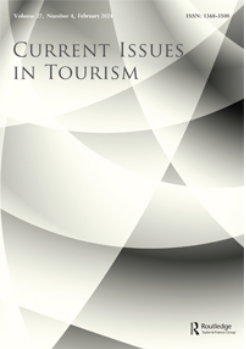Smart tourism destination (STD): developing and validating an impact scale using residents’ overall life satisfaction
IF 4.6
3区 管理学
Q1 HOSPITALITY, LEISURE, SPORT & TOURISM
引用次数: 0
智慧旅游目的地(STD):利用居民的总体生活满意度制定并验证影响量表
本文章由计算机程序翻译,如有差异,请以英文原文为准。
求助全文
约1分钟内获得全文
求助全文
来源期刊

Current Issues in Tourism
HOSPITALITY, LEISURE, SPORT & TOURISM-
CiteScore
15.50
自引率
10.00%
发文量
230
期刊介绍:
Journal metrics are valuable for readers and authors in selecting a publication venue. However, it's crucial to understand that relying on any single metric provides only a partial perspective on a journal's quality and impact. Recognizing the limitations of each metric is essential, and they should never be considered in isolation. Instead, metrics should complement qualitative reviews, serving as a supportive tool rather than a replacement. This approach ensures a more comprehensive evaluation of a journal's overall quality and significance, as exemplified in Current Issues in Tourism.
 求助内容:
求助内容: 应助结果提醒方式:
应助结果提醒方式:


